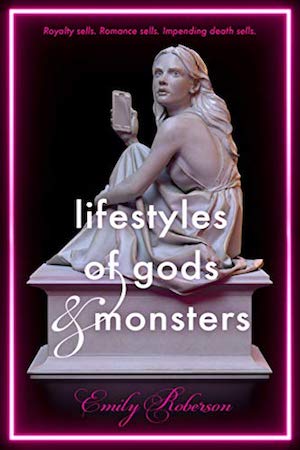If you, like me, pored over Greek myths for fun, you are familiar with the tale of Theseus and his defeat of the Minotaur. It is a story that is told and retold across stories and artwork to uplift the heroism of Theseus and describe the cruelty of the Greek gods. Lifestyles of Gods and Monsters by Emily Roberson takes this familiar tale and shifts the focus to princess Ariadne and her role in Theseus’ heroic deed for a young adult audience.
The novel takes place in a modern day Crete and focuses on Ariadne’s perspective. She is the introverted princess in a family of reality TV stars who rely on their popular TV series, The Paradoxes and the Labyrinth Contest to remain in power, to remain wealthy and to gain standing with their viewing public in a style reminiscent of Keeping Up With the Kardashians. Ariadne’s role is simple: she must lead the fourteen Athenian competitors into the labyrinth to meet their fate against the Minotaur each year in a highly stylized competition (much like the Hunger Games) in which the working class suffer for the entertainment of the ruling class. This is her duty and her penance, according to her father, King Minos, for questioning the gods’ decision to make her mother fall in love with the Cretan Bull and give birth to her brother, Asterion, the horrible creature known as the Minotaur. This has been her duty since she was a child, and she has fulfilled this duty as long as she can return to her life of solitude, escaping into the imaginary world of videogames which ironically simulate the heroes and adventures of real people that populate her world.
However, all this changes when handsome Theseus, newly crowned Prince of Athens, comes to Crete. His heroism and passion for protecting his people, hoping to kill the Minotaur and end the annual sacrifice of the Athenians disrupts all that Ariadne has accepted about her life of quiet duty and makes her reconsider her parent’s motivations and the true will of the gods.
While the novel remains mostly faithful to the original Greek tale, by focusing the novel into Ariadne’s perspective, the reader is given the opportunity to see how much of her life is regimented and controlled by her family, and how much she learns about her own lack of agency once that control slips. Her family lives their entire lives in the spotlight, curating storylines and dramas for their public to see, but rarely show the depths of their discomfort, grief or self-doubt. Acalle and Xenodice, the “Paradoxes,” and Ariadne’s older sisters, play the roles of wild royal socialites, but are still affected by domestic abuse in their relationships and addiction to deal with the pressure of being constantly in the public eye. Ariadne’s mother, Pasiphae, walks through life with a veneer of happiness that hides her unending and often destructive grief at the loss of her first born son, Androgeus during the war with Athens. And Minos, the King of Crete, uses his daughters as puppets to further his political ends.
Buy the Book


Lifestyles of Gods and Monsters
While the blooming love story between Theseus and Ariadne is at the forefront of the book, these moments also serve to empower Ariadne. In the original tale, Ariadne is said to have betrayed her father and her country, but this “betrayal” is complicated in the book to illustrate how Ariadne must stop accepting all that her family has told her, and to take accountability for her role in the sacrifice of innocent lives in a deception that affects an entire nation. Her compassion for her family and the Athenians tears her apart, but also give her strength. Some of the best moments in the book are when we see Ariadne visits her brother, Asterion, in the Labyrinth and shows her love and compassion for his plight. She prays to the gods to change his fate, to heal him, showing the tragedy not only in the deaths of the Athenians but in Asterion’s fate. In Ariadne’s eyes, the Minotaur is humanized. His pain and his rage complicate the idea of a bloodthirsty monster and make the reader consider how he also serves as a pawn to be manipulated for King Minos’ gain.
The novel is successful in adapting a well-known Greek story to make readers consider how much free will one really has in their lives, and how one can exercise it when they are manipulated by the forces of power beyond their control-the gods, their family, and even their entire nation. lifestyles of gods and monsters is a reimagining that could engage a new generation of readers to appreciate Greek mythology and re engage readers familiar with the stories to appreciate the story from Ariadne’s perspective.
Lifestyles of Gods and Monsters is available from Farrar, Straus & Giroux.
Read an excerpt here.
Leticia Urieta is proud Tejana writer from Austin, TX. She works as a teaching artist in the Austin community. She is a graduate of Agnes Scott College and holds an MFA in Fiction writing from Texas State University. Her work appears or is forthcoming in Cleaver, Chicon Street Poets, Lumina, The Offing, Kweli Journal, Medium, Electric Lit and others. Her chapbook, The Monster is out now from LibroMobile Press. She is currently at work completing her novel that tells the story of a Mexican soldadera caught up in the march to Texas during Texas’ war with Mexico.










